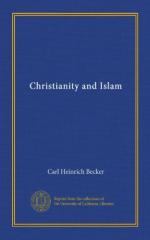This mediaeval theory of life was subjected, as is well known, to many compromises in the West, and was materially modified by Teutonic influence and the revival of classicism. It might therefore be supposed that in Islam Christian theory underwent similar modification or disappeared entirely. But the fact is not so. At the outset, we stated, as will be remembered, that Muhammedan scholars were accustomed to propound their dicta as utterances given by Muhammed himself, and in this form Christian ideas also came into circulation among Muhammedans. When attempts were made to systematise these sayings, all were treated as alike authentic, and, as traditional, exerted their share of influence upon the formation of canon law. Thus questions of temporary importance to mediaeval Christianity became permanent elements in Muhammedan theology.
One highly instructive instance may be given. During the century which preceded the Byzantine iconoclastic controversy, the whole of nearer Asia was disturbed by the question whether the erection and veneration of images was permissible. That Constantinople attempted to prohibit such veneration is well known: but after a long struggle the church gained its wishes. Islam was confronted with the problem and decided for prohibition, doubtless under Jewish influence. Sayings of Muhammed forbid the erection of images. This prohibition became part of canon law and therefore binding for all time: it remains obligatory at the present day, though in practice it is often transgressed. Thus the process of development which was continued in Christendom, came to a standstill in Islam, and many similar cases might be quoted.
Here begins the development of Muhammedan jurisprudence or, more exactly, of the doctrine of duty, which includes every kind of human activity, duties to God and man, religion, civil law, the penal code, social morality and economics. This extraordinary system of moral obligations, as developed in Islam, though its origin is obscure, is doubtless rooted in the ecclesiastical law of Christendom which was then first evolved. I have no doubt that the development of Muhammedan tradition, which precedes the code proper, was dependent upon the growth of canon law in the old Church, and that this again, or at least the purely legal part of it, is closely connected with the pre-Justinian legislation. Roman law does not seem to me to have influenced Islam immediately in the form of Justinian’s Corpus Juris, but indirectly from such ecclesiastical sources as the Romano-Syrian code. This view, however, I would distinctly state, is merely my conjecture. For our present purpose it is more important to establish the fact that the doctrine of duty canonised the manifold expressions of the theory that life is a religion, with which we have met throughout the traditional literature: all human acts are thus legally considered as obligatory or forbidden when corresponding with




